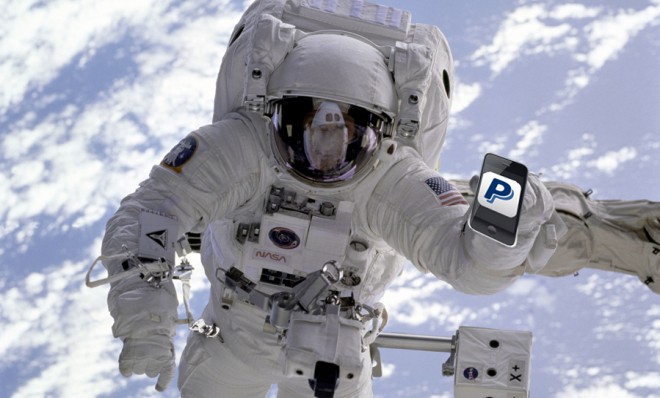How PayPal plans to conquer extraterrestrial commerce
The International Space Station may not take credit cards, but the burgeoning space tourism industry isn't going to be free


A free daily email with the biggest news stories of the day – and the best features from TheWeek.com
You are now subscribed
Your newsletter sign-up was successful
In October 2007, British foreign exchange firm Travelex introduced a new hard currency designed for use in outer space. Travelex named this "first currency of its kind in the universe" the very British-sounding QUID, or Quasi Universal Intergalactic Denomination. If you've never heard of the QUID, I suspect you're not alone. And now PayPal is hoping to go where no company, including Travelex, has gone before.
PayPal is teaming up with the SETI Institute, the Space Tourism Society, and astronaut Buzz Aldrin to launch the PayPal Galactic initiative. The idea behind creating a new currency for use in outer space is pretty simple: Space tourism is coming, and it's coming soon.
"Trips to Mars, the moon, even orbit will require we provide astronauts and astro-tourists with as many comforts from home as possible, including how to pay each other," Aldrin says in a statement. "Whether it's paying a bill, even helping a family member on Earth, we'll need access to money."
The Week
Escape your echo chamber. Get the facts behind the news, plus analysis from multiple perspectives.

Sign up for The Week's Free Newsletters
From our morning news briefing to a weekly Good News Newsletter, get the best of The Week delivered directly to your inbox.
From our morning news briefing to a weekly Good News Newsletter, get the best of The Week delivered directly to your inbox.
PayPal is convinced that while Travelex may have had a good idea, the QUID has a fatal flaw. "One thing is clear," says PayPal President David Marcus: "We won't be using cash in space." Normal credit cards won't do either, he says. The idea is to get a bunch of engineers, scientists, financial experts, and even other payment companies and come up with something new. "If we were creating a new payment system, I doubt it would look anything like the one that exists today," says Marcus.
At this stage, says PayPal communications director Anuj Nayar, "what PayPal Galactic is doing is getting the right people to ask the right questions." At first, space tourists will probably use some advanced form of an Earth currency, but that won't cut it as we move farther out from the home planet.
And that will happen "faster than any of us imagine," he says. The first space hotel plans to open in 2016, and Virgin Galactic is set to launch its first space tourism flight in December. "What's the currency you're going to pay for your morning coffee with?" Nayar asks.
The first step, says Nayar, is "to form a checklist of all the issues to consider — from taxes and regulations in space, to handling ISP addresses from orbit," he says. PayPal uses IP addresses for many of its algorithms, but that's Earth technology. And what about financial fraud and theft? "Once we have these questions down, we can start answering them and provide the framework for off-world commerce."
A free daily email with the biggest news stories of the day – and the best features from TheWeek.com
Eventually, you'll be able to order a pizza in space, pay for family photos in front of the Earth or other celestial objects, and purchase space souvenirs, says Heather Somerville in the San Jose Mercury News. But now it's "an idea so brain-busting and Jetsonian that it seems it could only exist in a science fiction novel."
Actually, space money is "a question that science-fiction writers have been dealing with for decades," long before Travelex came up with its advanced-plastic discs, says Alan Boyle at NBC News:
PayPal is going where many books and TV shows have gone before: Sci-fi writers have created a wide spectrum of extraterrestrial currencies, ranging from the solari of Dune to the cubits of Battlestar Galactica to the spacebucks of Spaceballs. The civilizations of Star Trek deal in Federation credits, Klingon darseks and even Triskelion quatloos for the occasional death match. [NBC News]
If space travel doesn't capture your imagination, or just seems too far out to take seriously, PayPal Galactic might still be beneficial for you, says PayPal's Nayar. "The borderless thinking that were using to create a commercial reality in space could lead to some fantastic innovations on Earth as well."
Here's PayPal's pitch:
Peter has worked as a news and culture writer and editor at The Week since the site's launch in 2008. He covers politics, world affairs, religion and cultural currents. His journalism career began as a copy editor at a financial newswire and has included editorial positions at The New York Times Magazine, Facts on File, and Oregon State University.
-
 The environmental cost of GLP-1s
The environmental cost of GLP-1sThe explainer Producing the drugs is a dirty process
-
 Greenland’s capital becomes ground zero for the country’s diplomatic straits
Greenland’s capital becomes ground zero for the country’s diplomatic straitsIN THE SPOTLIGHT A flurry of new consular activity in Nuuk shows how important Greenland has become to Europeans’ anxiety about American imperialism
-
 ‘This is something that happens all too often’
‘This is something that happens all too often’Instant Opinion Opinion, comment and editorials of the day
